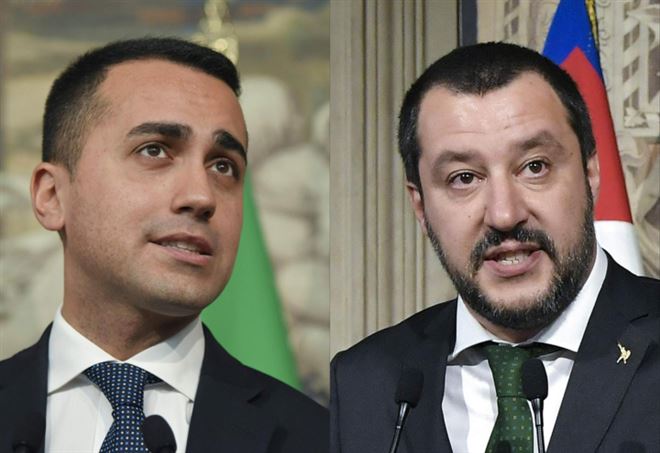
Luca Tomini is an IEE-ULB affiliated academic. He is a political scientist at the Université libre de Bruxelles, Center for the Study of Politics (CEVIPOL), and a specialist in political regimes and the process of political transition and regime changes. His most recent book, “When democracy collapses” has been published by Routledge.
Once again, it’s time to experiment in Italy. There is something completely new and different that is emerging in the Italian political laboratory. It has already happened, in history, that political formulas took shape and have been tested in Italy before being successfully applied elsewhere. There is a long-lasting Italian propensity to export political models and solutions (which is not always a positive one, we should note).
On March 4 legislative election took place in Italy. Despite the fact that results had been predicted by the polls, it was a truly political earthquake. The Democratic party (PD), which had led the government during the past five years, suffered a clear defeat scoring only 18.7%. The center-right alliance got the majority of seats in the parliament with 37% of the votes and, within the coalition, the League (previously Northern League – LN) was considered to be the great winner (going from 4% in the 2013 elections to 17%). The 5-star movement (M5S), for its part, reached 32% thus becoming the first political party represented in the parliament.
However, despite the excellent electoral result of two political forces up to that moment in the opposition (M5S and the League), actually no coalition or single party won sufficient seats to form a government. There were therefore three poles, none of which was autonomous to create a governmental majority, and for two months Italian political actors actually played what was exactly the ending scene of the classic Sergio Leone’s “The Good, the Bad and the Ugly.” Three actors in a dead end because of mutual vetoes. The center right was willing to form a government with the 5-star movement. The League did not want to form a government with the Democratic Party. The M5S was not willing to form a government with the entire center right coalition, but just with the League, or alternatively, with the Democratic Party which on turn was not willing to join forces with either the M5S or the League, but just to support a technocratic government.
After more than two months of stalemate and failed negotiations, the direct intervention of the President of the Republic forced the political actors to a compromise. When President Mattarella announced his intention to appoint a Prime minister that would have prepared Italy for new elections, at the last minute, the Five-star movement and the League finally started negotiating to create a new government. Eventually, Giuseppe Conte, a Law Professor without political experience, has been chosen by the two party as Prime Minister of the future coalition government.
What is really at stake…
A government formed by M5S and Lega is something unique and completely new for both Italy and the European Union. For the first time a founding country of the European Union, the third largest economy in the euro area, will be governed by two political forces that do not belong directly or indirectly to the three traditional European political families: Christian Democrats, Socialists or Liberals.
Uncertainty is high on what will happen, an much depends on the different compromises that the two political actors will reach in the course of their government activity. Nevertheless, several critical issues might emerge in the following months: relations with the European Union, the economic policy, foreign policy, as well as decisions on security and migration. However, this carte blanche gives special attention to an underlying political issue that will probably mark the following government.
Italy is probably going to open a new front in the battle on the very nature of contemporary democracies in Europe. After 1989, optimism on the fate of liberal democracy was spreading out and some even foresaw that this model of political regime would triumph without any competition. This “demo-optimism” did not last for long. Today, the perspective is completely different: in particular, after the crises that hit Europe, and the growth of the economic and geopolitical power of non-democratic regimes, today the principle of authoritarian governance has gained new momentum all over the world.
Considering Europe, a specific model of democracy is emerging as an alternative to traditional liberal democracy: what the literature on comparative political regime calls “delegative democracy” or, according to other scholars “illiberal democracy”. We should be aware of the fact that this model is gathering new supporters all around Europe, among governments and political parties. Technically, it is still a democratic system: elections are reasonably free, there is the possibility of participating in the electoral process and the possibility of political change. But in a delegative or illiberal democracy all checks and balances that prevents government from abuses of power, corruption, or misuse of public resources, in terms of judicial independence, respect for the Rule of Law, and media pluralism, are weak and someway controlled by the executive power.
Democracy should never be taken for granted. As democratization may happen, also its opposite, namely “autocratization” can. Venezuela, Russia, Thailand, Turkey, and even Hungary are all countries where this change took place in recent decades, albeit with different magnitude: politics becomes increasingly exclusive and monopolistic, and political power increasingly repressive and arbitrary.
Executive constraints, civil and individual liberties and political rights weaken, whereas government selection turns less competitive and less participatory. While rulers gain discretion and self-referentiality in the exercise and maintenance of political power, citizens lose protection from it and control over it.
In this broader context, the formation of the new government in Italy takes another meaning, which goes far beyond the Italian borders. Actually, delegative (or illiberal) democracy is not an indigenous Italian creation, but Italy can again become the laboratory where this model is adopted, tested and adapted by an important Western democracy, a founding member of the European Union, with all the international impact that this experiment might have. From this point of view, the alliance between these two political actors is worrisome.
On the one hand, there is a party that in recent years has undergone a “genetic mutation” from a regionalist to a nationalist ideology. A party that looks with interest to the models of government in Russia or Hungary, and positions itself clearly on the right spectrum on politics on civil liberties. On the other hand, there is a party/movement which has a hybrid, post-ideological nature, a very critical view of representative democracy and the myth of direct democracy. The 5-star movement’s normative conception of democracy is actually extremely ambiguous, with skepticism for counter-powers and political pluralism, a vertical management of the internal political debate and a poor consideration for the role of intermediate actors such as parties or unions.
…and what to expect. Particracy 2.0?
The future behavior of these two political actors within the logic of liberal democracy remains difficult to predict. However, a quick look to the final government contract signed by the Five Star and League might shed some light on what to expect. At the moment, two points of the agreement seem to be critical in relation to what has been underlined before. First, the introduction of a “Conciliation committee”. It would be an informal body, not provided for in the constitution, with the task of settling disagreements within the government coalition or elaborating common positions. While on the one hand, top-level meetings to address political issues among the government actors are not a disruptive news, on the other hand this innovation would create a potential “parallel” council of ministers that would diminish the prerogatives of the prime minister and the council of ministers.
Without being subjected to parliamentary scrutiny, this committee would potentially allow parties to centralize power in the hands of party leaders bypassing constitutional procedures.
Second, the abolition (though constitutional amendments) of the imperative mandate for parliamentary deputies.
This measure would limit the freedom of deputies crushing dissent and pluralism within parliament and paving the way for further centralization of power in the hand of party leaders towards parliamentary activities. Together, these political and institutional innovations would put the executive and legislative powers under a tight control of political parties and narrowed party elite, outlining a new form of “particracy”: the Italian way to delegative democracy.
On a positive note, there are several reasons to expect that the two political actors will be obliged to moderate their positions, because of the presence of strong domestic and external constraints (constitutional and political counter powers, media pluralism, political and social opposition, active role of the European union).
However, it cannot be excluded that, faced to all these counter powers and constraints, this new alliance will try to test Italian constitutional limits, provoking a progressive weakening of the mechanism of accountability. In this case, the current debate that is going on at EU level on possible mechanisms of supervision and sanctions for the violation of the principle of the separation of powers and the Rule of Law, will likely become even more urgent and necessary.
Image credits: Ilsussidiario.net
Interested in EU politics?
Are you a professional looking to deepen your knowledge of EU politics? Our executive programmes might be the answer.




